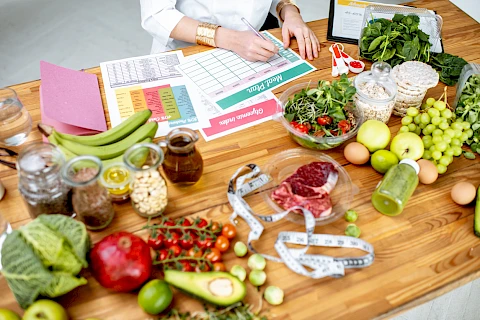
As a caregiver, having a senior meal planning guide allows you to ensure those in your care consume a nutritionally balanced diet that caters to their unique needs. However, it goes beyond the choice of groceries or food preparation. It involves understanding their dietary requirements, considering their preferences, and encouraging healthy eating habits, which we will help provide.
Getting to Know a Senior's Nutritional Needs
Nourishing needs change as we age. Here's a breakdown of some key factors to consider when caring for an older adult's diet:
- Metabolism slows down, requiring fewer calories to maintain a healthy weight.
- Certain nutrients become more important, such as protein for muscle health, calcium, and vitamin D for bone health.
- Health conditions may necessitate limitations on sodium, sugar, or other elements.
- Some medications can impact appetite or nutrient absorption, requiring dietary adjustments.
- Higher risk for dehydration. Ensure they consume plenty of fluids throughout the day.
- Including fiber-rich choices can promote a healthy digestive system.
Considering Individual Preferences and Dietary Restrictions
Eating is a multisensory experience, and preferences play a significant role in keeping them interested in their food. Familiar flavors can bring comfort and improve appetite. At the same time, eating restrictions should be respected, whether due to allergies, intolerances, or doctor's orders. The key is to balance nutrition, taste, and health needs. Variety within these constraints can keep the menu appealing.
Grocery Shopping for Older Adults
Grocery shopping for elderly loved ones requires careful planning. Focus on nutrient-dense foods over calorie-dense, processed ones, such as fresh fruits and vegetables, lean proteins, and whole grains. These options are healthier, generally more satisfying, and beneficial for maintaining a healthy weight. Additionally, always having some basic staples in the pantry—like canned beans, rice, and hearty soups—can simplify a senior meal planning guide.
Preparing Food for Older Retirees
Meal preparation is a practical way to ensure that nutritious foods are always available for older retirees, even on busy days. Making minor adjustments, such as cutting ingredients into smaller pieces or gently cooking vegetables, can help make them easier to handle. Preparing meals that can be frozen or quickly heated up ensures elderly retirees always have access to healthy choices. Appearance matters, stimulating appetite and making things more enjoyable.
Encouraging Wholesome Eating Habits in Golden-Agers
Family carers have a crucial role in promoting healthy eating habits. Regular meal times and a comfortable, social environment can make a significant difference. Consider altering textures if an older adult has difficulty chewing or swallowing. Smaller, more frequent snacks can benefit them with a poor appetite. The key is to stay flexible and patient, adapting to changing needs and preferences.
Need Help Planning Meals for Elderly Loved Ones?
Meal planning for relatives involves many considerations, as we've mentioned above. Caregivers can support them by ensuring a balanced diet and healthy eating habits, contributing to their overall well-being. If you live in Reno or Sparks and need expert help or advice on caring for family members, don't hesitate to contact us. Senior Helpers Reno offers specialists in elderly care, providing top-notch services tailored to each individual's needs.